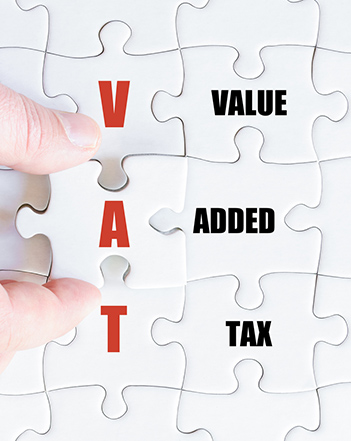
UAE has already introduced Value Added Tax (VAT) in 2018. UAE also levies Excise Tax on certain goods that are considered harmful to human health.
UAE has also been the signatory to join the most powerful multilateral treaty against offshore tax evasion and avoidance in the process of preventing Treaty Abuse. Further, the introduction of the Beneficial Owner Procedure in 2020 is in accordance with the Anti- Money Laundering Regulations.
Osol Al Khebra Group offer solutions across all tax disciplines to help you follow the rules and regulation laid down by Federal Tax Authority of UAE.



Our Tax Agents ensure to perform their following Duties:
Additionally, our VAT consultants will support you in developing your internal VAT procedures, involving finance management and bookkeeping operations, in accordance with the VAT system requirements as per FTA.
The tax laws of the UAE have given definitive rights to the authority for conducting a tax audit to protect the integrity of the tax systems.
Various laws and regulations issued by Ministry levy severe penalties, including prison sentences and other monetary penalties if a registrant is found guilty of non-compliance.
Our Role in Tax Audit in UAE:



Economic Substance Regulations in UAE is another compliance requirement for entities registered in UAE. ESR is applicable to all Licensee & Exempted Licensee carrying on the Relevant Activities in the UAE, including the Free Zone or Financial Free Zone.
Relevant Activities under UAE ESR:
How we assist you:
TRC is issued by FTA on application made by the resident of UAE. The necessity for TRC is to avail the benefit of Double Tax Avoidance Agreements. TRC is an ultimate proof to demonstrate that one is a tax resident of the UAE.
Tax Authorities across the globe accept TRC as a reliable document to authenticate the residency of an entity. The Legal person operating in the country for at least one year can make an application for the TRC. There are certain mandatory documents required to acquire the certificate.

The Ministry of Finance has announced that the UAE will introduce a federal corporate tax on business profits that will be effective for financial years starting on or after 1st June 2023. Businesses will become subject to UAE corporate tax from the beginning of their first financial year that starts on or after 1st June 2023.
With a standard statutory tax rate of 9 percent and a 0 percent tax rate for taxable profits up to AED375,000 to support small businesses and startups, the UAE corporate tax regime will be amongst the most competitive in the world.
No corporate tax will apply on personal income from employment, real estate and other investments, or on any other income earned by individuals that does not arise from a business or other form of commercial activity licensed or otherwise permitted to be undertaken in the UAE.
Recognizing the contribution of free zones to the UAE’s economy and competitiveness, the UAE corporate tax regime will continue to honor the corporate tax incentives currently being offered to free zone businesses that comply with all regulatory requirements and that do not conduct business with mainland UAE.
Corporate Tax is a form of direct tax levied on the net income or profit of corporations and other businesses
Corporate Tax is sometimes also referred to as “Corporate Income Tax” or “Business Profits Tax” in other jurisdictions
A competitive CT regime based on international best practices will cement the UAE’s position as a leading global hub for business and investment, and accelerate the UAE’s development and transformation to achieve its strategic objectives .
Introducing a CT regime reaffirms the UAE’s commitment to meeting international standards for tax transparency and preventing harmful tax practices
Most countries in the world have a comprehensive CT regime, including most of the GCC Member States
The UAE CT regime will become effective for financial years starting on or after 1 June 2023
Examples:
* A business that has a financial year starting on 1 July 2023 and ending on 30 June 2024 will become subject to UAE CT from 1 July 2023 (which is the beginning of the first financial year that starts on or after 1 June 2023)
* A business that has a (calendar year) financial year starting on 1 January 2023 and ending on 31 December 2023 will become subject to UAE CT from 1 January 2024 (which is the beginning of the first financial year that starts on or after 1 June 2023)
The UAE CT is a Federal tax and will therefore apply across all Emirates
The Federal Tax Authority will be responsible for the administration, collection, and enforcement of UAE CT
UAE CT will apply to all UAE businesses and commercial activities alike, except for the extraction of natural resources, which will remain subject to Emirate level corporate taxation
Foreign entities and individuals will be subject to UAE CT only if they conduct a trade or business in the UAE in an ongoing or regular manner
All activities undertaken by a legal entity will be deemed “business activities” and hence be within the scope of UAE CT
This would generally be done by reference to the individual having (or being required to obtain) a business license or permit to carry out the relevant commercial, industrial and/or professional activity in the UAE
The taxable income will be the accounting net profit / income of a business, after making adjustments for certain items to be specified under the UAE CT law
The accounting net profit / income of a business is the amount reported in the financial statements prepared in accordance with internationally acceptable accounting standards
The CT rates are:
* 0% for taxable income up to AED 375,000;
* 9% for taxable income above AED 375,000; and
* a different tax rate for large multinationals that meet specific criteria set with reference to ‘Pillar Two’ of the OECD Base Erosion and Profit Shifting project
A multinational corporation is a corporation that operates in its home country, as well as in other countries through a foreign subsidiary, branch or other form of presence / registration.
Merely earning income from outside its home country without a foreign presence or registration would not make a business a multinational corporation
In the context of the global minimum effective tax rate as proposed under ‘Pillar Two’ of the OECD Base Erosion and Profit Shifting project, ”large” refers to a multinational corporation that has consolidated global revenues in excess of EUR 750m (c. AED 3.15 bn)
UAE CT will not apply on an individual’s salary and other employment income (whether received from the public or private sector)
Business income earned under a commercial license will be within the scope of UAE CT
The investment in real estate by individuals in their personal capacity should not be subject to UAE CT provided the individual is not required to obtain a commercial license or permit to carry out such activity in the UAE
Individuals will not be subject to UAE CT on dividends, capital gains and other income earned from owning shares or other securities in their personal capacity
UAE CT will generally apply to income earned from activities carried out under a freelance license / permit, albeit no CT will be payable unless the annual net income of the freelance professional exceeds AED 375,000
Interest and other income earned by an individual from bank deposits or saving schemes will not be subject to UAE CT
The CT liability will be calculated as follows:
* Taxable income of AED 0 – AED 375,000 at 0% = AED 0
* Portion of taxable income exceeding AED 375,000
(i.e. AED 400,000 – AED 375,000 = AED 25,000) at 9% = AED 2,250The UAE CT liability for the year will be AED 0 + AED 2,250 = AED 2,250
The final amount of UAE CT payable will be reduced by any foreign taxes incurred on the relevant income (see below further questions on this topic)
Dividends and capital gains earned by a UAE business from its qualifying shareholdings will be exempt from UAE CT
A qualifying shareholding refers to an ownership interest in a UAE or foreign company that meets certain conditions to be specified in the UAE CT law
UAE CT will generally not be levied on a foreign investor’s income from dividends, capital gains, interest, royalties and other investment returns
Free zone businesses will be subject to UAE CT, but the UAE CT regime will continue to honor the CT incentives currently being offered to free zone businesses that comply with all regulatory requirements and that do not conduct business with mainland UAE
A company established in a free zone will be required to register and file a CT return
Further details on the compliance obligations of free zone businesses will be provided in due course
The UAE CT treatment that will apply to businesses in free zones will be the same across all free zones
Businesses engaged in the extraction of natural resources will remain subject to Emirate level corporate taxation and be outside the scope of the UAE CT
Banking operations will be subject to UAE CT
Further details on the current Emirate level corporate taxation will be provided in due course
Excess tax losses may be carried forward and used against taxable income in future years, provided certain conditions are met
Further information on the UAE CT loss carry-forward rules will be provided in due course
Tax losses from one group company may be used to offset taxable income of another group company, provided certain conditions are met
Further information on the group loss utilization rules will be provided in due course
A UAE group of companies can elect to form a tax group and be treated as a single taxable person, provided certain conditions are met
A UAE tax group will only be required to file a single tax return for the entire group
Withholding tax is tax collected at source by the payer on behalf of the recipient of the income
Withholding taxes exist in many tax systems and are typically used in respect of dividends, interest, royalties and similar payments
UAE withholding tax will not be applicable on domestic and cross-border payments of any nature under the UAE CT regime
Foreign CT paid on UAE taxable income will be allowed as a tax credit against the UAE CT liability
Transfer pricing rules seek to ensure that transactions between related parties are carried out on arm’s length terms (i.e. as if the transaction was carried out between independent parties)
UAE businesses will need to comply with transfer pricing rules and documentation requirements set with reference to the OECD Transfer Pricing Guidelines
Only one CT return will need to be filed per financial period
No provisional or advance CT filings will be required
A financial period is generally a year
The CT return will need to be filed electronically. Further guidance will be issued in this regard in due course
UAE businesses will not be required to make advance UAE CT payments
Similar to other taxes in the UAE (e.g. VAT), businesses will be subject to penalties for non-compliance with the CT regime.
Further information on the UAE CT compliance obligations and applicable penalties will be released in due course
As a registered Tax Agency with FTA, our qualified registered tax Agents and consultants will ensure the Tax compliance with the Corporate Tax regulation.
We will support you with respect to the following:
Schedule your complimentary consultation with us today and begin your journey towards finding solutions and achieving your goals.

Osol Alkhebra Is Your Central Destination For Comprehensive Management Consulting, Accounting, And Auditing Services In UAE. Offering Everything From Advisory Services To Tax Auditing, We Provide A Diverse Range Of Services To A Broad Clientele.
© 2024 – Osol Alkhebra. All Rights Reserved, Designed and Developed By NXP Technologies L.L.C